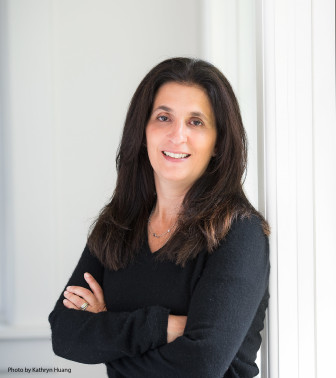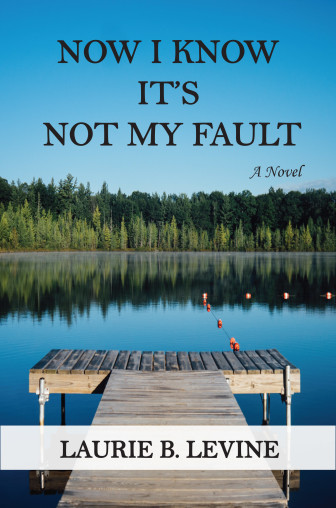When Laurie B. Levine heard that a teacher in her hometown of Maplewood had been charged with sexual misconduct with several male students, her first reaction was to make sure her teenage son, who was in the class, was okay. Levine, a family therapist, was also encouraged to revisit the novel she had started years before, about a trauma bond between a student and female teacher.
Levine’s debut young adult novel Now I Know It’s Not My Fault (publication date: January 15, 2017; available on Amazon) is the story of a teenager who finds herself in a traumatic relationship with her charming teacher in the 1980s. Alexandra Geller is a bright but underachieving girl with a mother who has been dead for five years, and a father who is emotionally unavailable as he throws himself into his career as a physician. At the beginning of freshman year, Alex’s science teacher Paula senses Alex’s vulnerability and befriends her, leading Alex to believe that she was chosen by Paula to be in a “mother-daughter” type of relationship. The relationship soon becomes abusive.
It’s a sensitive topic — especially in South Orange and Maplewood in light of the arrest and legal battles of former CHS teacher Nicole Dufault — but at least one local says Levine has pulled it off thoughtfully: “Now I Know It’s Not My Fault is a thoroughly absorbing and cautionary tale that reminds us of the vulnerability of our children, the power of those in positions of authority, and the complex nature of abuse. It’s an important read for teens, parents, and mental health professionals,” wrote Maplewood resident Lauren Meisels, PhD.
Now I Know It’s Not My Fault is intended to be about teenagers facing the challenges of growing up in a complex world where sometimes adults cross lines and boundaries, creating the potential for abuse. As an experienced marriage and family therapist, Levine says she is aware of how insidious these behaviors can be in relationships. Her portrayal of Paula and Alex’s friendship points out a scenario that is not always recognized for the problem that it is, with even longer-lasting effects.
In Now I Know It’s Not My Fault, Alex ultimately stands up to her abuser, in spite of their damaging relationship that takes place through her entire high school career. Levine says that readers will also learn more about how these inappropriate student-teacher trauma bonds can be formed, and what to do about it.
Below is an interview with Levine provided byClaire McKinney Public Relations:
Dr. Laurie B. Levine is a private practice Marriage and Family Therapist in Maplewood, NJ. For over twenty years, she has been helping people understand their trauma stories.
Now I Know It’s Not My Fault is the story of an underachieving teenager who is pulled into an unhealthy friendship with her pretty, charming teacher. Why did you write this book? Is it based on actual events?
There were two objectives for me in writing this book. The first was to shed some light on the fact that women can be abusers too. There’s a lot written in abuse and trauma literature addressing men as abusers, but very little about women. I wanted to write a story that depicts an attractive, charming woman in that role. The second was that it’s important to draw attention to a more subtle form of abuse. When most people think about child sexual abuse, they think about an adult engaging in direct sexual contact with a child. Now I Know It’s Not My Fault highlights a kind of abuse that occurs under the radar, but can be just as damaging.
Over the last 25 years I’ve had many people—clients, friends, acquaintances—share their trauma stories with me. The novel isn’t based on any one person. The characters in the book are composites drawn from a wide variety of those stories.
The main character, Alexandra, lost her mother, and the relationship with her teacher was her attempt at filling that maternal void. Does she choose Alex because she senses that void as a “weakness” to take advantage of? Why would an adult seek out a child to “groom” them into a relationship?
Abusers are very skilled at identifying vulnerabilities in people. Paula, the teacher, is great example of that. Alex is a lonely kid, and she depends on her friend Sandra to help her because Sandra is more organized and mature. Paula has been watching this, and probably had her eye on Alex for some time. We see that when Alex and and her friend Amber go for extra help for the first time. Paula tells Alex, “I knew you were cute but I didn’t realize, until today, you’re also really funny.” Alex is flattered because she realizes Paula has been paying more attention to her than she thought.
Paula, like other abusers, is charming and charismatic. She’s artful in using those qualities to draw Alex into the relationship, and later make her want to stay. Paula understands Alex’s vulnerabilities and actually meets some of Alex’s emotional needs, giving her the illusion of having a mother figure. The tone of the relationship changes as Paula begins to punish/humiliate Alex. This probably meets some deep, unexpressed pain for Paula but leaves Alex desperate for Paula’s nurturing and reassurance. The more punishing Paula becomes the more Alex needs her to diminish the pain. Ultimately, Alex needs Paula and what she’s offering, and doesn’t even consider leaving the relationship.
What is a trauma bond? How does Paula and Alex’s relationship reflect this?
A trauma bond is a way describe the deep, and sometimes lasting, connection a child has to her abuser. It’s a direct result of the grooming. The abuser does actually meet some of the vulnerable child’s needs at the beginning, and throughout the relationship. Paula creates painful, humiliating situations for Alex, then acts loving and forgiving. This cycle leaves Alex desperately needing Paula as a direct result of what Paula has done to her.
One key aspect of a trauma bond is that it can last well past the end of the abusive relationship. The abuser skillfully and effectively meets the deepest needs of the child at first to gain her trust, and then keep her in the relationship. This is the very thing that’s so attractive emotionally to the child, and so even after the relationship, the child will long for the connection.
After her mother died, Alex’s father threw himself into his career as a doctor, allowing Alex to feel left out. Is his absence as a parent one of the reasons Alex befriended Paula? How could he have avoided this situation?
Alex’s father is a guy who never imagined himself being a single parent. He expected to have a very traditional life; he would work and his wife would be at home with the children. It sounds like that’s not necessarily what she wanted, but it does seem like the family was shaping up to be fairly traditional. So, when we meet him, he’s overwhelmed with responsibilities he never thought he’d have and probably doesn’t want. And he misses his wife. Paula comments to Alex that it seems like her dad never got over the loss of his wife. This rings true for Alex.
Alex’s questionable self-esteem is really the thing that made her vulnerable to Paula. If she felt better about herself, she would have been less open to Paula and might not have been willing to trade the abuse for what she thought was love. Dr. Geller could have paid more attention to helping Alex develop self-esteem by being more accepting of who she was. She wasn’t interested in math and science, but she did excel in English and reading. He could have supported her academic strengths and interests, which would have made her feel accepted by him. All of this could have protected her from someone like Paula.
What is the first step that you recommend a child or their parents do if they suspect there is mental abuse coming from an adult?
It’s important to ask the right questions. Often, when parents suspect some kind of abuse they ask, “Did something happen?” Alex’s father asks her this very question. The problem with that question is that the word something implies sex. For Alex, sex was never overtly part of what was happening to her. So, when her dad asked her that, she felt completely misunderstood by him once again. She wasn’t having sex with anyone, and was tired of being accused of it. Some different, more effective questions might be: “Is Paula doing or saying anything that makes you uncomfortable?” or “Is Paula doing or saying anything that makes you feel badly about yourself?” He might have gotten a different answer if he asked one of those questions.
What do you think happened to Alex after her relationship with Paula ended? Where do you think Alex is now, as an adult?
I think Alex struggles with what Paula even after the relationship ends. Paula moves on from Alex quickly with her new marriage and impending motherhood. It takes Alex much longer to move on from Paula, and the trauma bond is a big piece of that. Alex needed Paula deeply, and at time, Paula did meet some of her emotional needs. Even though Alex did come to see Paula’s behavior as abusive, she misses the closeness she thought she had with Paula. Alex’s ability to trust other women, and even herself and her own perceptions, has been compromised. This makes Alex wary of letting her guard down in other close relationships. My hope is that Alex found herself a good therapist who can help her expand on what Erica, her camp counselor, has already explained about Paula and the real nature of the relationship. Ultimately, Alex is able to move past the abuse, but I don’t think she stopped trying to find someone who could mother her.
What is next for you as a writer?
I really like Alex and I might be interested in looking at where she is a little down the road, maybe in college or young adulthood. I also love the relationships between the girls at camp, the idea that six of them have been to camp year after year and grown up together. I’d like to explore those relationships a little deeper—plus, I loved camp.
NOW I KNOW IT’S NOT MY FAULT
By Dr. Laurie B. Levine
Publication Date: January 15th, 2017
ISBN: 9781535511582
Original Trade Paperback & E-book
Price: $14.99 / $9.99
299 Pages



